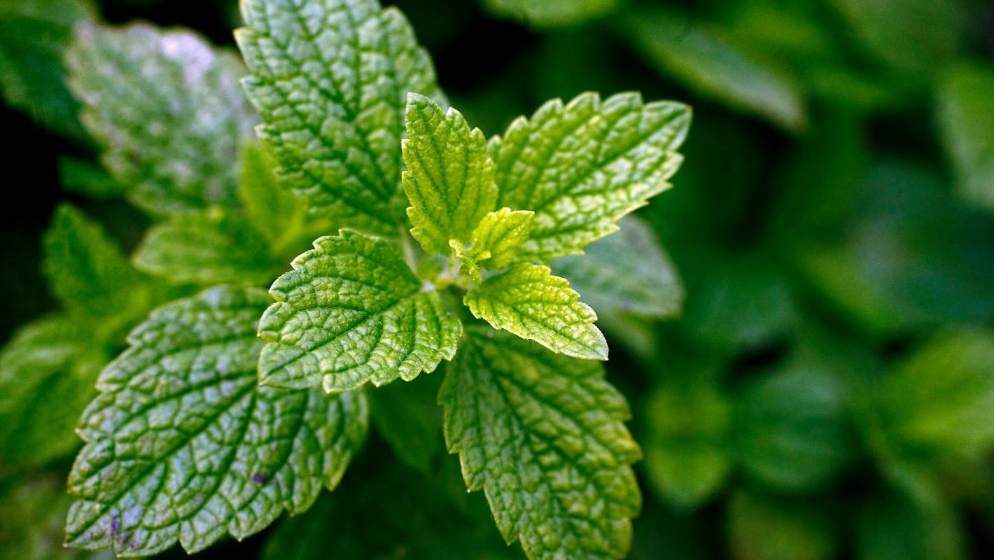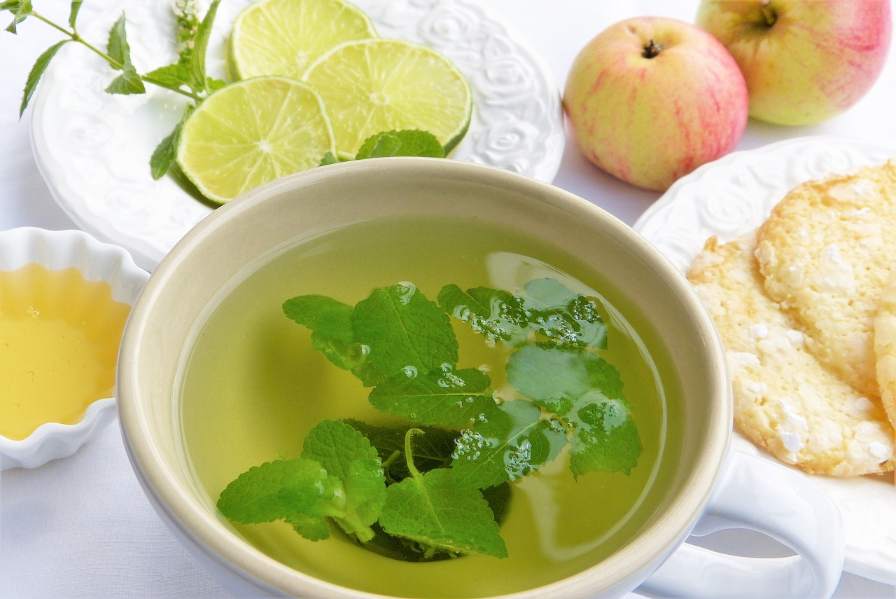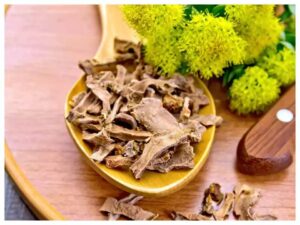The Discovery of Lemon Balm: A Mysterious History
Ancient Origins of Lemon Balm
Lemon Balm (Melissa officinalis) is a fragrant herb that has been used for centuries for its medicinal properties. The plant is native to the Mediterranean region, and its use can be traced back to ancient Greek and Roman times. According to legend, the herb was discovered by the ancient Greek physician and philosopher, Dioscorides.
Dioscorides’ Discovery
As the story goes, Dioscorides was wandering through the countryside one day when he came across a group of bees buzzing around a patch of lemon balm. Intrigued by the sweet scent of the plant, he decided to taste a leaf. He was immediately struck by the herb’s pleasant flavor and aroma, and he began to experiment with it in his medical practice.
Medieval Use of Lemon Balm
During the Middle Ages, lemon balm was widely used throughout Europe as a medicinal herb. It was believed to have a calming effect on the nerves and was often used to treat anxiety, insomnia, and other nervous disorders. The plant was also used to treat digestive problems and was believed to have antiviral and antibacterial properties.
Lemon Balm in Traditional Medicine
In traditional medicine, lemon balm has been used to treat a wide range of ailments, including colds, fever, headaches, menstrual cramps, and insect bites. It has also been used as a natural remedy for depression, and some studies have suggested that it may help to improve cognitive function and memory.
Modern Research on Lemon Balm
In recent years, there has been a growing interest in the medicinal properties of lemon balm, and a number of scientific studies have been conducted to explore its potential health benefits. Research has shown that the herb may have antiviral, antibacterial, and anti-inflammatory properties, and it may also help to improve mood, reduce stress, and promote restful sleep.
The Mystery of Lemon Balm’s Discovery
Despite its long history of use, the exact origin of lemon balm remains something of a mystery. While the story of Dioscorides’ discovery is often cited as the plant’s origin story, there is little evidence to support this claim.
Some historians believe that the plant may have been discovered independently by multiple cultures, given its widespread use in traditional medicine across different regions of the world. Others speculate that the herb may have been brought to Europe from the Middle East during the Crusades or via the Silk Road trade routes.
Conclusion
While the exact origins of lemon balm may remain shrouded in mystery, there is no doubt about the plant’s many health benefits. From its use in ancient Greece and Rome to its modern-day applications, lemon balm has been valued for its medicinal properties for centuries. Whether you’re looking to reduce stress, improve your mood, or simply enjoy its delicious flavor, lemon balm is a versatile herb that is sure to impress.

The Health Benefits of Lemon Balm: A Comprehensive Guide
Lemon Balm for Digestive Health
Lemon balm has traditionally been used to soothe digestive problems, including gas, bloating, and indigestion. The herb may help to relax the muscles in the digestive tract and reduce inflammation, which can ease discomfort and promote healthy digestion.
One study published in the Journal of Ethnopharmacology found that lemon balm extract significantly reduced the severity of gastric ulcers in rats. The researchers concluded that lemon balm may be a promising natural remedy for the prevention and treatment of gastric ulcers in humans.
Another study published in the journal Planta Medica found that lemon balm extract was effective at reducing symptoms of functional dyspepsia, a common digestive disorder characterized by bloating, nausea, and abdominal pain. The study participants who took the lemon balm extract experienced significant improvements in their symptoms compared to those who took a placebo.
Lemon Balm for Stress and Anxiety
Lemon balm has long been used as a natural remedy for stress and anxiety. The herb has a calming effect on the nervous system and may help to reduce feelings of anxiety and promote relaxation.
Several studies have investigated the use of lemon balm for anxiety. One study published in the journal Phytotherapy Research found that a combination of lemon balm and valerian root was effective at reducing symptoms of anxiety in study participants. Another study published in the journal Nutrients found that lemon balm extract was effective at reducing symptoms of anxiety and improving mood in healthy volunteers.
Lemon Balm for Sleep
Lemon balm may also be beneficial for promoting restful sleep. The herb has a calming effect on the nervous system and may help to reduce feelings of anxiety and promote relaxation, which can lead to better sleep quality.
One study published in the journal Pharmacology Biochemistry and Behavior found that lemon balm extract was effective at improving sleep quality in adults with mild-to-moderate insomnia. The study participants who took the lemon balm extract experienced significant improvements in their sleep quality and reported feeling more refreshed in the morning compared to those who took a placebo.
Lemon Balm for Cognitive Function
Lemon balm may also have benefits for cognitive function and memory. The herb contains compounds that may help to protect the brain from oxidative stress and inflammation, which are associated with cognitive decline.
One study published in the Journal of Alzheimer’s Disease found that lemon balm extract improved cognitive performance and reduced agitation in study participants with moderate-to-severe Alzheimer’s disease. Another study published in the Journal of Psychopharmacology found that a combination of lemon balm and sage improved cognitive function and mood in healthy young adults.
Lemon Balm for Cold Sores
Lemon balm has antiviral properties that may help to reduce the frequency and severity of cold sores, which are caused by the herpes simplex virus.
One study published in the journal Phytomedicine found that a cream containing lemon balm extract was effective at reducing the duration and severity of cold sores in study participants. The researchers concluded that lemon balm may be a safe and effective natural treatment for cold sores.
Lemon Balm for Immune Function
Lemon balm may also have benefits for immune function. The herb contains compounds that have been shown to have antimicrobial and antiviral properties, which may help to support the immune system and prevent infections.
One study published in the journal Phytotherapy Research found that lemon balm extract was effective at reducing the duration and severity of cold and flu symptoms in study participants. Another study published in the journal Antiviral Research found that lemon balm essential oil was effective at inhibiting the replication of the herpes simplex virus.
Lemon Balm for Skin Health
Lemon balm may also have benefits for skin health. The herb contains compounds that have anti-inflammatory and antioxidant properties, which may help to protect the skin from damage and promote healthy aging.
One study published in the Journal of Ethnopharmacology found that lemon balm extract was effective at reducing skin inflammation in mice. Another study published in the Journal of Drugs in Dermatology found that a cream containing lemon balm extract and other natural ingredients was effective at reducing the appearance of fine lines and wrinkles in study participants.
Lemon Balm for Menstrual Cramps
Lemon balm may also be beneficial for reducing menstrual cramps. The herb has a relaxing effect on the muscles and may help to reduce pain and discomfort associated with menstruation.
One study published in the Journal of Herbal Medicine found that a combination of lemon balm and ginger was effective at reducing menstrual pain in study participants. Another study published in the Journal of Obstetrics and Gynaecology Canada found that a combination of lemon balm and chamomile was effective at reducing menstrual pain and anxiety in study participants.
Lemon Balm for Diabetes
Lemon balm may also have benefits for people with diabetes. The herb contains compounds that have been shown to improve insulin sensitivity and reduce blood sugar levels.
One study published in the Journal of Clinical Biochemistry and Nutrition found that lemon balm extract was effective at reducing blood sugar levels in rats with diabetes. Another study published in the Journal of Medicinal Food found that lemon balm extract improved insulin sensitivity and reduced blood sugar levels in study participants with type 2 diabetes.
Lemon Balm for Cardiovascular Health
Lemon balm may also have benefits for cardiovascular health. The herb contains compounds that have been shown to improve blood lipid levels and reduce inflammation, which are both risk factors for heart disease.
One study published in the journal Phytomedicine found that lemon balm extract improved blood lipid levels in study participants with high cholesterol. Another study published in the Journal of Agricultural and Food Chemistry found that lemon balm extract reduced inflammation and oxidative stress in the blood vessels of rats.
Conclusion
Lemon balm is a versatile herb with a long history of use in traditional medicine. The herb has been shown to have numerous health benefits, including improved digestion, reduced stress and anxiety, better sleep quality, improved cognitive function and memory, reduced cold sore outbreaks, improved immune function, better skin health, reduced menstrual cramps, improved blood sugar control, and improved cardiovascular health.
While more research is needed to fully understand the potential health benefits of lemon balm, the existing scientific evidence suggests that this herb is a safe and effective natural remedy for a variety of health conditions. If you are interested in trying lemon balm for its medicinal properties, it is recommended that you consult with a qualified healthcare professional to determine the appropriate dosage and form of the herb for your individual needs.

The Nutritional Components and Core Ingredients of Lemon Balm
Nutritional Components of Lemon Balm
Lemon balm is a rich source of vitamins, minerals, and antioxidants, which are essential for maintaining good health. The herb is particularly high in vitamin C, which is a powerful antioxidant that supports immune function and helps to protect against oxidative stress and inflammation.
Lemon balm is also a good source of vitamin A, which is important for healthy vision, immune function, and skin health. The herb is rich in minerals like calcium, magnesium, and potassium, which are important for maintaining strong bones, healthy muscles, and normal heart function.
Core Ingredients of Lemon Balm
Lemon balm contains a number of active ingredients that contribute to its many health benefits. These include:
Rosmarinic Acid
Rosmarinic acid is a powerful antioxidant and anti-inflammatory compound that is found in high concentrations in lemon balm. This compound helps to protect the body against oxidative stress and inflammation, which are associated with many chronic diseases.
Studies have shown that rosmarinic acid may be effective at reducing symptoms of allergy and asthma, as well as improving cognitive function and memory.
Eugenol
Eugenol is a compound found in many herbs and spices, including lemon balm. This compound has antiseptic, analgesic, and anti-inflammatory properties, and may be beneficial for relieving pain and reducing inflammation in the body.
Studies have shown that eugenol may be effective at reducing symptoms of arthritis, as well as improving oral health and preventing tooth decay.
Citronellal
Citronellal is a compound found in many citrus fruits and herbs, including lemon balm. This compound has a pleasant lemony scent and flavor, and is commonly used in perfumes and fragrances.
Studies have shown that citronellal may have antimicrobial and antifungal properties, and may be effective at reducing symptoms of skin infections and fungal overgrowth.
Other Active Ingredients of Lemon Balm
In addition to the core ingredients discussed above, lemon balm contains a number of other active compounds that contribute to its many health benefits. These include:
Triterpenoids
Triterpenoids are a class of compounds found in many plants, including lemon balm. These compounds have anti-inflammatory and antioxidant properties, and may be beneficial for reducing the risk of chronic diseases.
Studies have shown that triterpenoids may be effective at reducing inflammation in the body, as well as protecting against oxidative stress and damage to the cells.
Flavonoids
Flavonoids are a group of compounds found in many fruits, vegetables, and herbs, including lemon balm. These compounds have antioxidant and anti-inflammatory properties, and may be beneficial for reducing the risk of chronic diseases.
Studies have shown that flavonoids may be effective at reducing the risk of heart disease, as well as improving cognitive function and memory.
Conclusion
Lemon balm is a rich source of various nutritional components and active ingredients, which contribute to its many health benefits. The herb is particularly high in vitamin C, vitamin A, and minerals like calcium, magnesium, and potassium.
Lemon balm also contains a number of active ingredients, including rosmarinic acid, eugenol, and citronellal, which have antioxidant, anti-inflammatory, and antimicrobial properties. Other active compounds in lemon balm, such as triterpenoids and flavonoids, also contribute to its many health benefits.
If you are interested in incorporating lemon balm into your diet for its nutritional and medicinal properties, there are several ways to do so. You can add fresh or dried lemon balm leaves to your salads, smoothies, or teas, or use lemon balm essential oil in aromatherapy or as a natural remedy for various health conditions.
While lemon balm is generally considered safe for most people when used in moderation, it is recommended that you consult with a qualified healthcare professional before using it as a natural remedy, particularly if you are pregnant, breastfeeding, or have a medical condition.
In conclusion, lemon balm is a nutrient-dense herb with many health benefits. Its rich nutritional profile and active ingredients make it a valuable addition to a healthy diet and lifestyle. Whether you are looking to improve your digestion, reduce stress and anxiety, or promote restful sleep, lemon balm is a versatile herb that can help support your overall health and wellbeing.
Methods for Consuming Lemon Balm: A Comprehensive Guide
Introduction
Lemon balm (Melissa officinalis) is a versatile herb that can be consumed in a variety of ways. The herb has a sweet lemony scent and flavor, and its leaves are commonly used in teas, tinctures, and other natural remedies. In this article, we will explore the various methods for consuming lemon balm and how they can be used to promote health and wellness.
Fresh Lemon Balm Leaves
One of the simplest ways to consume lemon balm is to use fresh leaves in cooking or to make a fresh tea. To use fresh lemon balm leaves, simply rinse them under cold water and pat them dry with a paper towel. You can then add the leaves to salads, soups, stews, or other dishes for a mild lemony flavor.
To make a fresh lemon balm tea, place a handful of fresh leaves in a teapot or mug, and pour boiling water over the leaves. Let the tea steep for 5-10 minutes, then strain out the leaves and enjoy.
Dried Lemon Balm Leaves
Dried lemon balm leaves can be used in a variety of ways, including making teas, tinctures, and infused oils. To dry lemon balm leaves, simply hang them upside down in a warm, dry place for several days until they are fully dried. You can then store the dried leaves in an airtight container for later use.
To make a dried lemon balm tea, place a teaspoon of dried leaves in a teapot or mug, and pour boiling water over the leaves. Let the tea steep for 5-10 minutes, then strain out the leaves and enjoy.
Lemon Balm Tincture
A lemon balm tincture is a concentrated liquid extract of the herb that can be used as a natural remedy for a variety of health conditions. To make a lemon balm tincture, you will need dried lemon balm leaves, alcohol, and a glass jar with a tight-fitting lid.
To make the tincture, fill the glass jar halfway with dried lemon balm leaves, then cover the leaves with alcohol. Shake the jar well to mix the ingredients, then store it in a cool, dark place for several weeks. After several weeks, strain the liquid through a cheesecloth or coffee filter, and store the tincture in a dark glass bottle.
To use the tincture, dilute a few drops in water or tea, and consume it orally.
Lemon Balm Infused Oil
Lemon balm infused oil is a popular remedy for skin conditions like eczema, psoriasis, and acne. To make a lemon balm infused oil, you will need dried lemon balm leaves, a carrier oil like olive oil or coconut oil, and a glass jar with a tight-fitting lid.
To make the infused oil, fill the glass jar halfway with dried lemon balm leaves, then cover the leaves with the carrier oil. Shake the jar well to mix the ingredients, then store it in a warm, sunny place for several weeks. After several weeks, strain the liquid through a cheesecloth or coffee filter, and store the infused oil in a dark glass bottle.
To use the infused oil, apply a small amount to the affected area of the skin and massage it in gently.
Lemon Balm Essential Oil
Lemon balm essential oil is a highly concentrated liquid extract of the herb that can be used in aromatherapy or as a natural remedy for a variety of health conditions. To make lemon balm essential oil, the herb is typically steam-distilled to extract the concentrated oil.
To use lemon balm essential oil, dilute a few drops in a carrier oil like coconut oil or jojoba oil, and apply it topically to the skin, or add a few drops to a diffuser to enjoy its aromatherapy benefits.
Lemon Balm Capsules
Lemon balm capsules are a convenient way to consume the herb for its medicinal properties. These capsules typically contain a standardized extract of the herb, which ensures a consistent dosage of the active ingredients.
To use lemon balm capsules, simply follow the dosage instructions on the label, and consume them with a glass of water or another beverage.
Lemon Balm Tea Bags
Lemon balm tea bags are a convenient and easy way to enjoy the benefits of the herb. These tea bags typically contain dried lemon balm leaves, and can be used to make a fresh cup of tea in just a few minutes.
To make lemon balm tea using tea bags, simply place a tea bag in a mug, and pour boiling water over the bag. Let the tea steep for 5-10 minutes, then remove the bag and enjoy.
Lemon Balm in Culinary Recipes
Lemon balm can also be used in a variety of culinary recipes, including soups, salads, and sauces. The herb pairs well with fish, chicken, and other light meats, and can be used to add a mild lemony flavor to dishes.
To use lemon balm in culinary recipes, simply chop the leaves finely and add them to the dish near the end of the cooking process. You can also use fresh or dried lemon balm leaves to make a marinade or dressing for your favorite dishes.

Potential Side Effects and When to Avoid Taking Lemon Balm
While lemon balm is generally safe for most people, it may cause side effects in some individuals, particularly when consumed in high doses or over an extended period of time. Some of the potential side effects of lemon balm include:
Gastrointestinal Disturbances
Lemon balm may cause gastrointestinal disturbances in some individuals, including nausea, vomiting, and stomach pain. These side effects are typically mild and resolve on their own within a few hours.
Drowsiness
Lemon balm has mild sedative properties, and may cause drowsiness or dizziness in some individuals, particularly when consumed in high doses. If you experience these side effects, it is recommended that you avoid driving or operating heavy machinery until they have resolved.
Allergic Reactions
In rare cases, lemon balm may cause allergic reactions in some individuals, particularly those who are sensitive to other plants in the mint family. Symptoms of an allergic reaction may include itching, hives, difficulty breathing, and swelling of the face, lips, tongue, or throat. If you experience any of these symptoms after consuming lemon balm, seek medical attention immediately.
Interactions with Medications
Lemon balm may interact with certain medications, including sedatives, thyroid hormone replacement therapy, and medications that affect the central nervous system. If you are taking any medications, it is recommended that you consult with a qualified healthcare professional before using lemon balm as a natural remedy.
When to Avoid Taking Lemon Balm
While lemon balm is generally safe for most people, there are some situations in which it may be best to avoid consuming the herb. These situations include:
Pregnancy and Breastfeeding
There is limited research on the safety of consuming lemon balm during pregnancy and breastfeeding. While the herb is generally considered safe in moderate amounts, it is recommended that pregnant and breastfeeding women avoid consuming lemon balm or use it only under the guidance of a qualified healthcare professional.
Children
There is limited research on the safety of consuming lemon balm in children. While the herb is generally considered safe in moderate amounts, it is recommended that children avoid consuming lemon balm or use it only under the guidance of a qualified healthcare professional.
Thyroid Disorders
Lemon balm may interfere with thyroid hormone replacement therapy, and may exacerbate symptoms of hyperthyroidism in some individuals. If you have a thyroid disorder, it is recommended that you consult with a qualified healthcare professional before using lemon balm as a natural remedy.
Surgery
Lemon balm may have mild sedative properties, and may interact with anesthesia and other medications used during surgery. If you are scheduled for surgery, it is recommended that you stop using lemon balm at least two weeks before the procedure.
Conclusion
Lemon balm is a natural herb that has many health benefits, but it may cause side effects in some individuals, particularly when consumed in high doses or over an extended period of time. Gastrointestinal disturbances, drowsiness, allergic reactions, and interactions with medications are among the potential side effects of lemon balm.
It is recommended that pregnant and breastfeeding women, children, and individuals with thyroid disorders avoid consuming lemon balm or use it only under the guidance of a qualified healthcare professional. Additionally, individuals scheduled for surgery should stop using lemon balm at least two weeks before the procedure.
While lemon balm is generally considered safe for most people, it is important to be aware of the potential side effects and when to avoid taking the herb. If you experience any adverse effects after consuming lemon balm, stop using it immediately and consult with a qualified healthcare professional.
In conclusion, lemon balm is a valuable herb with many health benefits, but it may cause side effects in some individuals. By being aware of the potential side effects and when to avoid taking the herb, you can minimize the risk of adverse effects and enjoy its medicinal properties safely and effectively. If you have any concerns about consuming lemon balm, it is recommended that you consult with a qualified healthcare professional for guidance.
WebMD: Lemon Balm – https://www.webmd.com/vitamins/ai/ingredientmono-437/lemon-balm
NCBI: Lemon balm: An overview of its versatility, effectiveness, and indications – https://www.ncbi.nlm.nih.gov/pmc/articles/PMC5871149/
Gardening Know How: Tips for Growing Lemon Balm – https://www.gardeningknowhow.com/edible/herbs/lemon-balm/growing-lemon-balm.htm
Mountain Rose Herbs: Lemon Balm Profile – https://mountainroseherbs.com/lemon-balm






